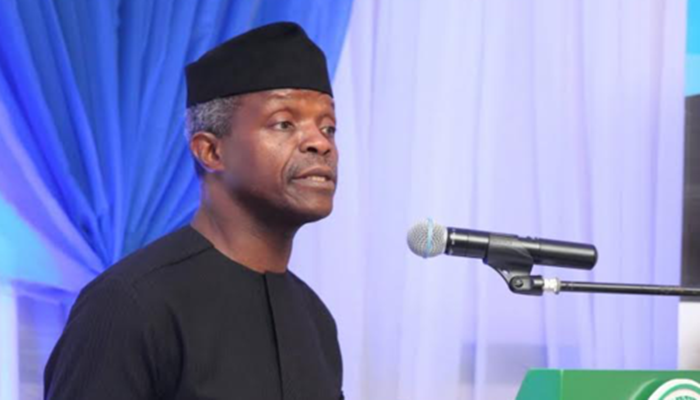
The Buhari administration is making progress tackling the problem of malnutrition in the country through the implementation of various intervention programmes, and increased funding, according to Vice President Yemi Osinbajo, SAN.
The Vice President disclosed this on Tuesday at the 2020 Virtual Conference on Nutrition in Nigeria, organized by the Aisha Buhari Foundation in collaboration with development partners.
Speaking on the progress made by the Federal Government, the Vice President said though Nigeria has distinct factors that has exacerbated the situation, the Federal Government has in the past few years demonstrated commitment towards addressing the problem through increase budgeting for nutrition activities and targeting it’s Social Investment Programmes towards tackling malnutrition.
According to him, “…the administration ensured progressive increases in budgetary allocations to nutrition activities in the country. There has been an increased investment of about N3.8 billion by Federal and State governments especially for the procurement of Ready-to-Use Therapeutic Foods (RUTF).
He also listed, “…the revitalization of the Primary Health Care System with nutrition as the primary focus, the promotion of optimum breastfeeding and improved quality of complementary food.”
Continuing, Prof. Osinbajo said tremendous progress have been recorded as a result of the administration’s efforts in collaboration with other stakeholders.
“Noticeably, there have been a decline in stunting and wasting; stunting, from about 44% in 2017 to about 37% in 2019 and wasting from 10.8% in 2017 to 7% in 2019, and an increase in exclusive breast feeding amongst children under 6 months from about 24% in 2017 to 29% in 2019.
The VP added that the Social Investment Programmes (SIPs has also been helpful), “particularly the Home-Ground School Feeding Programme for public schools currently feeds over 9 million children across 34 States and the FCT, serving one nutritious meal every day; and our Conditional Cash Transfer Scheme that has provided cash transfers to about 1.2 million beneficiaries so far, to boost income.”
Speaking on how government in collaboration with stakeholders can sustain the gains, the Vice President said improved collaboration and innovative thinking would be required to scale interventions and effectively address the problem.
“Clearly, we need to increase domestic financing. And the only way to do so is to look more at what we can do at both the Federal and State levels. But more importantly, to direct funding to communities with the greatest needs.
“I think civil society advocacy before the National Assembly is crucial to drawing attention to what you consider as priority. There are always several competing needs for resources and sometimes your strong voices especially directed as the debates that are going on can make a real difference in what ends up in the budgets, not just in the federal but even in the state budgets.”
Continuing, the Vice President said “budget funds from both states and federal governments cannot meet all of the needs. We believe that ultimately, the pool of funds from the mandatory health insurance programme will be an important contributor to financing nutrition.
“We need to aggregate a pool of fund outside the budget fund which is why our proposal for mandatory health insurance is one that we consider very important not just for health care but also for the nutrition interventions that we have proposed.
The Vice President however noted that raising funds alone might not address the issue, stressing that “the efficient and transparent deployment of resources and coordinating the contributions of our local and international partners” was important for better results to be achieved.
In her address at the event, the First Lady, Hajiya Aisha Buhari, represented by the Wife of the Vice President, Mrs Dolapo Osinbajo, said the conversation about ending malnutrition in Nigeria should be embraced by all and sundry given the effect of the problem on society.
According to her, “the conversation about stopping malnutrition in Nigeria must continue. We will only stop when we have created systems that can guarantee the survival of our children, we will only stop when governments at the various levels back up their commitments to tackling the problem, and when the civil society realizes its role and commitment to this cause.”
Other participants at the conference include Governor Mohammad Inuwa Yahaya of Gombe State, Minister of Health, Prof. Osagie Ehanire; Minister of State, Budget and National Planning, Mr Clement Agba; the representative of the Minister of Finance, among others.






